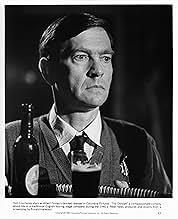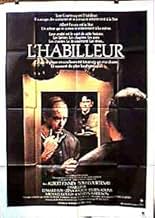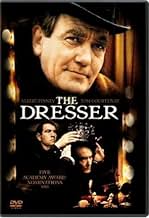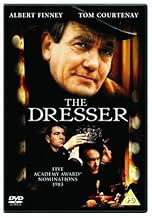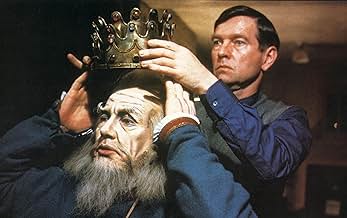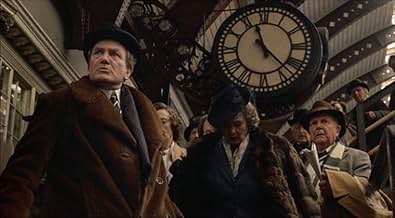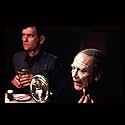PUNTUACIÓN EN IMDb
7,5/10
6 mil
TU PUNTUACIÓN
Añade un argumento en tu idiomaPersonal assistant Norman struggles to get deteriorating veteran actor Sir through a difficult performance of King Lear.Personal assistant Norman struggles to get deteriorating veteran actor Sir through a difficult performance of King Lear.Personal assistant Norman struggles to get deteriorating veteran actor Sir through a difficult performance of King Lear.
- Nominado para 5 premios Óscar
- 5 premios y 17 nominaciones en total
Anne Blackman
- Beryl
- (as Anne Mannion)
Reseñas destacadas
'The Dresser' is one of those films which are so perfect you really struggle to find something not to like about them. Written by Ronald Harwood (himself a former dresser to the legendary Donald Wolfit), it sparkles with energy and true love of life behind the footlights.
As 'Sir', the overbearing actor and main focus of the play, Albert Finney is a joy to watch - whether complaining about the lack of a storm during the 'blow, winds ...' bit of 'King Lear' or chatting to his faithful stage manager, Madge (Eileen Atkins, good as ever) about the old times. As Norman, his camp dresser, Tom Courtenay gives a fabulous performance, wiggling around at the beck and call of 'Lear', collecting a bottle to go at the pub, or bitchily disparaging the former Fool, Mr Davenport-Scott (often mentioned, but never seen!).
In an engaging support cast, there's Edward Fox as Oxenby (a typical arrogant second lead), Zena Walker as her Ladyship, Lockwood West as the replacement Fool, and many others.
This film has great energy, bringing with it some of the greasepaint of its stage origins, it is true, but being so well-acted you don't notice. Very well done indeed.
As 'Sir', the overbearing actor and main focus of the play, Albert Finney is a joy to watch - whether complaining about the lack of a storm during the 'blow, winds ...' bit of 'King Lear' or chatting to his faithful stage manager, Madge (Eileen Atkins, good as ever) about the old times. As Norman, his camp dresser, Tom Courtenay gives a fabulous performance, wiggling around at the beck and call of 'Lear', collecting a bottle to go at the pub, or bitchily disparaging the former Fool, Mr Davenport-Scott (often mentioned, but never seen!).
In an engaging support cast, there's Edward Fox as Oxenby (a typical arrogant second lead), Zena Walker as her Ladyship, Lockwood West as the replacement Fool, and many others.
This film has great energy, bringing with it some of the greasepaint of its stage origins, it is true, but being so well-acted you don't notice. Very well done indeed.
What happens backstage is always true drama. And often pure comedy. Such is the case of The Dresser, a film about an effeminate wardrobe man who is devoted to the deteriorating lead of the acting troupe he travels with. The film takes place in one night about a particularly difficult performance of William Shakespeare's King Lear. Albert Finney plays Sir, the lead role of the performance. He is in no condition to perform such a difficult role, yet he perseveres anyways with the help of his Dresser, Norman (Tom Courtenay). The two powerful leads are the highlight of this beautiful film.
The Dresser is what acting is all about. It is an intriguing blend of film acting and stage acting. Albert Finney and Tom Courtenay give exquisite and robust performances. Their conflicting personalities make them a delightful pair to watch interact. The acting in this film has the kind of prowess and impact of a stage performance with its loud and exaggerated movements. This kind of acting only works in certain settings, and The Dresser is a perfect example of where it not only works but is very necessary. It allows for a detachment from reality, drawing one into the theatrical world, something which stands out in such a unique and perplexing way.
Peter Yates directs this film with precise and aesthetically glamorous grandeur. It is a grand film that doesn't go too far out of line and never gets lost in itself. Yates directs with a keen eye for subtle detail and sparkling brilliance. The film is written with the same kind of subdued wit and beauty, making the film fit together nicely. The dialouge is great and the actors who deliver it bring so much life to the characters and script that it makes for a brilliant expose of the acting world.
The Dresser is a great film that accomplishes beauty and immersion without an immaculate setting. The film is subtly fantastic. Definitely check this one out.
The Dresser is what acting is all about. It is an intriguing blend of film acting and stage acting. Albert Finney and Tom Courtenay give exquisite and robust performances. Their conflicting personalities make them a delightful pair to watch interact. The acting in this film has the kind of prowess and impact of a stage performance with its loud and exaggerated movements. This kind of acting only works in certain settings, and The Dresser is a perfect example of where it not only works but is very necessary. It allows for a detachment from reality, drawing one into the theatrical world, something which stands out in such a unique and perplexing way.
Peter Yates directs this film with precise and aesthetically glamorous grandeur. It is a grand film that doesn't go too far out of line and never gets lost in itself. Yates directs with a keen eye for subtle detail and sparkling brilliance. The film is written with the same kind of subdued wit and beauty, making the film fit together nicely. The dialouge is great and the actors who deliver it bring so much life to the characters and script that it makes for a brilliant expose of the acting world.
The Dresser is a great film that accomplishes beauty and immersion without an immaculate setting. The film is subtly fantastic. Definitely check this one out.
"The Dresser" is a small but absolutely wonderful film, brilliantly acted by Albert Finney and Tom Courtenay. How in the world this tiny film attracted enough attention to garner five major Academy Award nominations back in 1983 is a mystery to me, but it's nice to know the Academy can be guilty of a display of good taste every once in a while (of course, they gave the award that year to "Terms of Endearment"-- after all, they don't want to be accused of showing TOO much taste).
Albert Finney is a drunken Shakespearean actor in a production of "King Lear"; Tom Courtenay is the man who works double time behind the scenes to keep this actor in front of the footlights. It's both hilarious and piteous to see Courtenay's character showering Finney's with attention and affection, only to see his efforts utterly unappreciated and dismissed, even up to the very bitter end. Finney and Courtenay work wonders together, and though Finney gets the showiest moments (he does get to recite Shakespeare after all), Courtenay is the heart and soul of the film.
Grade: A
Albert Finney is a drunken Shakespearean actor in a production of "King Lear"; Tom Courtenay is the man who works double time behind the scenes to keep this actor in front of the footlights. It's both hilarious and piteous to see Courtenay's character showering Finney's with attention and affection, only to see his efforts utterly unappreciated and dismissed, even up to the very bitter end. Finney and Courtenay work wonders together, and though Finney gets the showiest moments (he does get to recite Shakespeare after all), Courtenay is the heart and soul of the film.
Grade: A
This is a movie that deserves another look--if you haven't seen it for a while, or a first look--if you were too young when it came out (1983). Based on a play by the same name, it is the story of an older actor who heads a touring Shakespearean repertory company in England during World War II. It deals with his stress of trying to perform a Shakespeare each night while facing problems such as bombed theaters and a company made up of older or physically handicapped actors--the young, able bodied ones being taken for military service. It also deals with his relationship with various members of his company, especially with his dresser. So far it all sounds rather dull but nothing could be further from the truth. While tragic overall, the story is told with a lot of humor and emotions run high throughout. The two male leads both received Oscar nominations for best actor and deservedly so. I strongly recommend this movie to anyone who enjoys human drama, theater--especially Shakespeare, or who has ever worked backstage in any capacity. The backstage goings-on make up another facet of the movie that will be fascinating to most viewers.
Adapted by a 1981 Broadway sensation, its film counterpart is a hidden treasure of its time (although it achieved 5 nominations in the Oscar including BEST PICTURE, BEST DIRECTOR, BEST ACTORX2 and BEST ADAPTED SCREENPLAY) but has been rarely mentioned and seen by a younger generation, I have no idea of its existence until recently. I feel kind of cherished to have a chance to watch this UK production since the play-in-a-play structure generally is my cup of tea.
Then it proves that this is an exceedingly diverting film from the late director Peter Yates even though the quintessence of pleasure may lie in Finney and Courtenay's crack two-hander, which is beyond any thespian methods, two utterly gallant performances brilliantly deliver every tiny little nuance and never descend into a stasis of tedious affectation. Theatrical adaption has always been an impeccable showcase for actors. A copybook triumph from both Finney and Courtney. The King Lear play in the film proffers a tour-de-force stage for Finney's expertise and his overpowering sway is both intimidating and entertaining; as for Courtenay, whose character molding even merits more pluck due to the self-challenging devoutness. Which one I prefer, after some contemplative thinking, despite of Finney's pretty fierce endeavor, I will choose Courtenay, a lesser known actor but achieves a more startling reverberation.
Among the supporting roles, Eileen Atkins is managing to steal some flare from two leading players, she is so underrated and should be ranked alongside Maggie Smith, Judi Dench and Helen Mirren, among the most venerated names inside the so-called UK Dame coterie.
The film has set up a perfect mode for the contemporary play-goes-film trend, within some minimal usage of settings, the impact has been magnified in an index level to be seen by a much larger audience. The screenplay is the keystone here, that's why they're emerging in an inexhaustible tide which verifies that theatrical play is an endless fodder-provider for both awards-craving production companies and thespians.
Then it proves that this is an exceedingly diverting film from the late director Peter Yates even though the quintessence of pleasure may lie in Finney and Courtenay's crack two-hander, which is beyond any thespian methods, two utterly gallant performances brilliantly deliver every tiny little nuance and never descend into a stasis of tedious affectation. Theatrical adaption has always been an impeccable showcase for actors. A copybook triumph from both Finney and Courtney. The King Lear play in the film proffers a tour-de-force stage for Finney's expertise and his overpowering sway is both intimidating and entertaining; as for Courtenay, whose character molding even merits more pluck due to the self-challenging devoutness. Which one I prefer, after some contemplative thinking, despite of Finney's pretty fierce endeavor, I will choose Courtenay, a lesser known actor but achieves a more startling reverberation.
Among the supporting roles, Eileen Atkins is managing to steal some flare from two leading players, she is so underrated and should be ranked alongside Maggie Smith, Judi Dench and Helen Mirren, among the most venerated names inside the so-called UK Dame coterie.
The film has set up a perfect mode for the contemporary play-goes-film trend, within some minimal usage of settings, the impact has been magnified in an index level to be seen by a much larger audience. The screenplay is the keystone here, that's why they're emerging in an inexhaustible tide which verifies that theatrical play is an endless fodder-provider for both awards-craving production companies and thespians.
¿Sabías que...?
- CuriosidadesRonald Harwood based his play "The Dresser", and this movie's subsequent screenplay, on the biography "Sir Donald Wolfit CBE: His life and work in the Unfashionable Theatre", and on his own experiences as an actor and dresser for renowned Shakespearian actor Donald Wolfit. Harwood's repertory ensemble, Shakespeare Company, frequently performed Shakespeare's plays, and Harwood was Wolfit's dresser between 1953 and 1958.
- PifiasAfter Sir and Norman leave the marketplace, they're passed by a Routemaster bus. These buses were first used in London in 1954, and weren't used outside London until the 1970's.
- ConexionesEdited into The Clock (2010)
- Banda sonora(We're Going To Hang Out) The Washing the Siegfried Line
(uncredited)
Music by Michael Carr
Lyrics by Jimmy Kennedy
Sung by Tom Courtenay (as Norman)
Selecciones populares
Inicia sesión para calificar y añadir a tu lista para recibir recomendaciones personalizadas
- How long is The Dresser?Con tecnología de Alexa
Detalles
Taquilla
- Presupuesto
- 1.456.000 GBP (estimación)
- Recaudación en Estados Unidos y Canadá
- 5.310.748 US$
- Recaudación en todo el mundo
- 5.310.748 US$
Contribuir a esta página
Sugerir un cambio o añadir el contenido que falta


